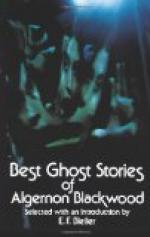Morning brought to Darcy a flood of hard commonsense, as clear and crisp as the sunshine that filled his room. Slowly as he woke he gathered together the broken threads of the memories of the evening which had ended, so he told himself, in a trick of common hypnotism. That accounted for it all; the whole strange talk he had had was under a spell of suggestion from the extraordinary vivid boy who had once been a man; all his own excitement, his acceptance of the incredible had been merely the effect of a stronger, more potent will imposed on his own. How strong that will was, he guessed from his own instantaneous obedience to Frank’s suggestion of sleep. And armed with impenetrable commonsense he came down to breakfast. Frank had already begun, and was consuming a large plateful of porridge and milk with the most prosaic and healthy appetite.
“Slept well?” he asked.
“Yes, of course. Where did you learn hypnotism?”
“By the side of the river.”
“You talked an amazing quantity of nonsense last night,” remarked Darcy, in a voice prickly with reason.
“Rather. I felt quite giddy. Look, I remembered to order a dreadful daily paper for you. You can read about money markets or politics or cricket matches.”
Darcy looked at him closely. In the morning light Frank looked even fresher, younger, more vital than he had done the night before, and the sight of him somehow dinted Darcy’s armor of commonsense.
“You are the most extraordinary fellow I ever saw,” he said. “I want to ask you some more questions.”
“Ask away,” said Frank.
* * * * *
For the next day or two Darcy plied his friend with many questions, objections and criticisms on the theory of life and gradually got out of him a coherent and complete account of his experience. In brief then, Frank believed that “by lying naked,” as he put it, to the force which controls the passage of the stars, the breaking of a wave, the budding of a tree, the love of a youth and maiden, he had succeeded in a way hitherto undreamed of in possessing himself of the essential principle of life. Day by day, so he thought, he was getting nearer to, and in closer union with the great power itself which caused all life to be, the spirit of nature, of force, or the spirit of God. For himself, he confessed to what others would call paganism; it was sufficient for him that there existed a principle of life. He did not worship it, he did not pray to it, he did not praise it. Some of it existed in all human beings, just as it existed in trees and animals; to realize and make living to himself the fact that it was all one, was his sole aim and object.
Here perhaps Darcy would put in a word of warning. “Take care,” he said. “To see Pan meant death, did it not?”
Frank’s eyebrows would rise at this.
“What does that matter?” he said. “True, the Greeks were always right, and they said so, but there is another possibility. For the nearer I get to it, the more living, the more vital and young I become.”




